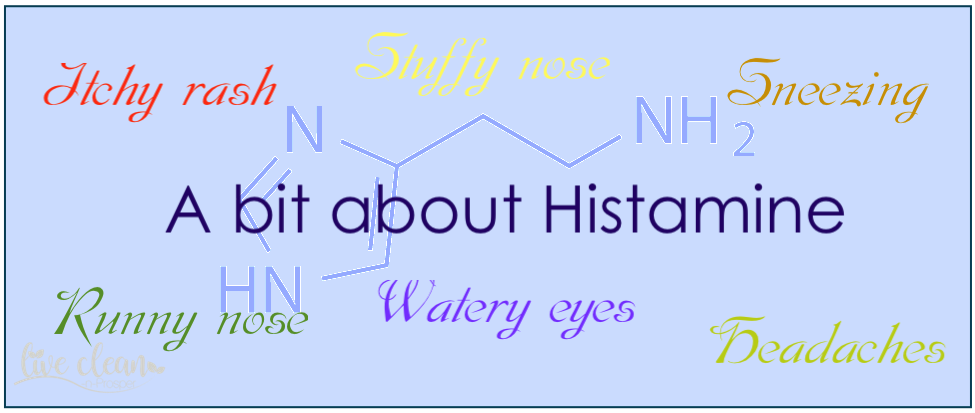Todays post is about histamine or histamines.
You’ve most likely heard of antihistamines. They’re medicines that tame the symptoms of an allergic reaction. But what are histamines?
Histamine is a biologically active substance found in a variety of living organisms. It is found throughout the animal kingdom and is present in many plants, bacteria and in insect venom.
Histamines are actually chemicals made by the body’s immune system. They serve as neurotransmitters, carrying chemical messages between nerve cells. Therefore they are also part of the body’s defence system. They assist the body to eliminate something that’s irritating it, such as an allergy trigger, or “allergen.”
Histamines start the process that hustles those allergens out of your body or off your skin. Once your immune system identifies the allergens as a threat, it responds. Such as sending histamines which cause you to sneeze, tear up, or itch.
How does this happen?
First, it sends a chemical signal to “mast cells” located in the skin, lungs, nose, mouth, gut, and blood. The message is, “Release histamines,” which are stored in the mast cells.
Once they leave the mast cells, histamines boost blood flow in the area of the body affected by the allergen. This causes inflammation, which allows white blood cells and blood plasma proteins, to leak from the bloodstream to the site of injury or infection. Once there they begin to fight the infection.
In an allergic reaction, the immune system gets caught in a viscous cycle. Immune system proteins called antibodies, which are bound to mast cells, bind to the antigens to remove them. In the process, the mast cells are stimulated to release more histamine. The result is histamine in excessive amounts creating the visible symptoms of a localised allergic reaction. These include a runny or stuffy nose, sneezing, watery or itchy eyes and hives.
Contact reactions
Allergic contact dermatitis, or hives, is a common skin condition that causes an itchy and weeping rash. The rash is usually localised to the area in contact with the allergen. It lasts as long as contact continues and typically one to two weeks afterwards. Even if the contact was very short, a rash can actually develop two or more days after contact.
Nickel metal is the most common cause of allergic contact dermatitis. Other causes include plants, chemicals, creams and ointments.
Foods and Histamines
If you have a food allergy, histamines are in on that response process, too. When you accidentally eat or drink something you shouldn’t, they’ll work in your gut to trigger your allergic reaction.
The most common foods known to cause a reaction are – nuts, shellfish, food additives, eggs, strawberries, and wheat products
Some foods are also naturally high in histamines. These include aged and fermented foods and alcohol (especially red wine).
(Sources –https://www.webmd.com,https://www.allergy.org.au, https://www.britannica.com)
On a personal note
I recently suffered from a contact allergic reaction on my arm. I am still not exactly sure of the cause, though possibly plant or insect. The result was an incredibly itchy patch of hives, which persisted for 10 days. Alternating between liberal applications of Rosemary oil and Calamine lotion helped immensely.
Till the next post,
Live clean n prosperAs a


